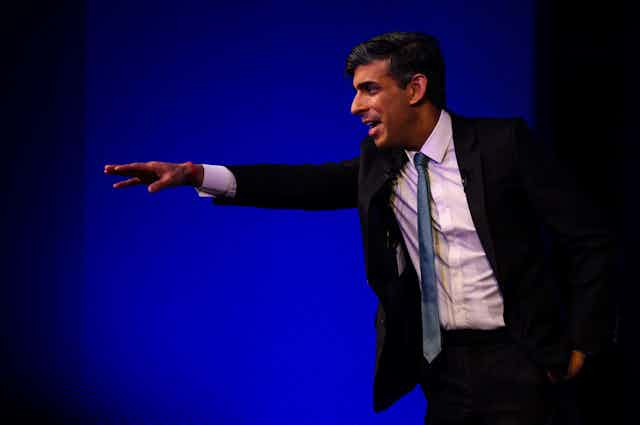One of the key findings of research into elections is that there is a close relationship between the popularity of party leaders and support for their parties in elections. The reason for this relates to how people make up their minds when voting. Many people consider issues or draw on their sense of attachment to a political party, but most look at the party leaders.
The leader personifies the party for many voters, particularly those who are confused about policies and don’t feel attached to any party. They use a simple rule of thumb: if they like a leader then they are inclined to vote for his or her party.
Colleagues and I explain this reasoning more fully in our new book, Brexit Britain. Faced with policy choices the consequences of which are difficult if not impossible to forecast, voters rely on their impressions of competing party leaders for assistance. This means that a good deal of voting is about who is in charge as much as about the policies advocated by a party.
Recent polling shows that Rishi Sunak is doing much better than his predecessor Liz Truss. YouGov found in March that that 34% thought he was doing well while 49% thought he was doing badly.
The Relationship between perceptions that the prime minister is doing well and Conservative vote intentions 2019 to 2023:

At first sight this does not appear to be a strong endorsement of the prime minister, but it is a massive improvement on his predecessor’s performance. When asked the same question about Truss In October 2022 only 11% thought she was doing well and 71% thought she was doing badly.
The past two elections have shown a close relationship between how people perceive the prime minister and whether they intend to vote for the Conservative MP in their constituency. Boris Johnson was popular and led a party enjoying strong voting intentions. Truss was not, and led a party that was also losing popularity.
This correlation between Conservative vote intentions and perceptions of the prime minister’s performance was very strong. Where a perfect one-to-one association between two variables would have a score of one and no association at all would have a score of zero, this correlation has a score of 0.80.
This raises an intriguing question. If Sunak succeeds in delivering on the five priorities he set out at the start of his premiership and so becomes more popular, will this help the Conservatives to win the next general election?
Past, present, future
It is of course important to remember that the correlation between Sunak’s popularity and voting intentions is not the same as a causal relationship. Prime ministerial popularity might drive voting support, but it is equally possible that the relationship runs the other way round.
That said, it is possible to get a handle on this by looking at correlations over time. If there is a strong correlation between Conservative voting intentions this month and the popularity of the prime minister last month, the causal link must run from PM popularity to vote intentions and not the other way round (because what happens now can’t influence what happened a month ago).
In this way we can untangle the causal links. This approach was introduced by the late Clive Granger, an economist who won the Nobel prize for this and other work.
On the other hand, if past voting intentions strongly correlate with the current popularity of the prime minister this suggests the causal link runs in the opposite direction. In both cases we are looking at the effects of the past on the present.
The data show us that there is clearly two-way causation between the two, so they interact with each other. However, the effect of Conservative voting on PM popularity is stronger than the effect of PM popularity on voting. We know this because voting has a longer impact on popularity than the other way round.
This means that if Rishi Sunak does succeed in delivering on his promises and becomes more popular this will help to boost the Conservative vote. However, given that currently the Conservatives are between 15 and 20 points behind Labour in voting intentions he is going to need his party to become more popular for reasons other than his personal approval ratings to have a chance of winning the next election.

